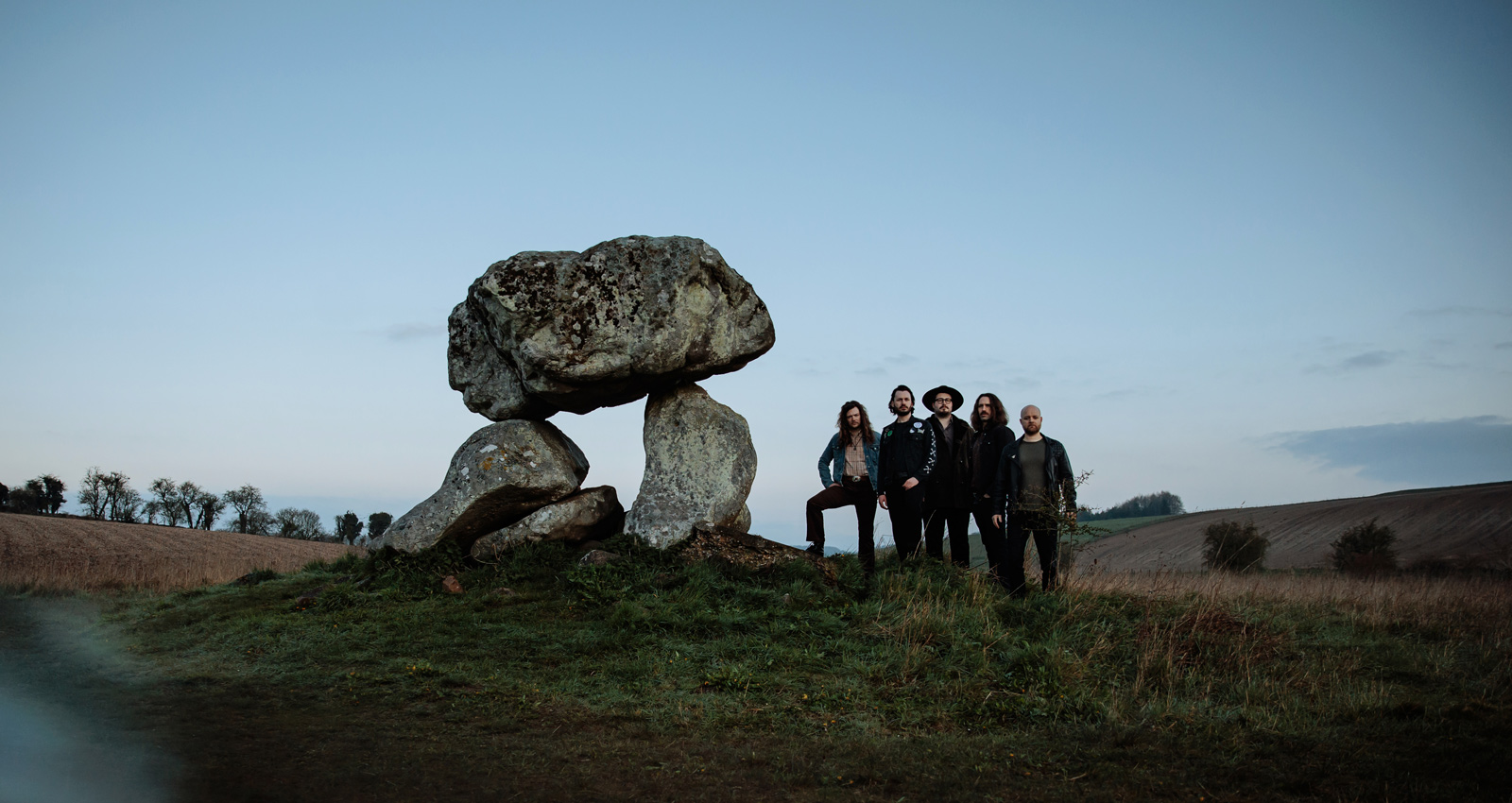
When Green Lung frontman Tom Templar was growing up in rural Norfolk, he loved going into London to visit the museums, filing away the strange relics and ancient artifacts in his still-developing brain. “I was obsessed with museums,” he confirms. “We have the Natural History Museum in London, which is this incredible Victorian flamboyant building that, when you’re a little kid, can’t help but set your imagination alight. And I’ve always been a collector and chronicler of things, even when I was really little.”

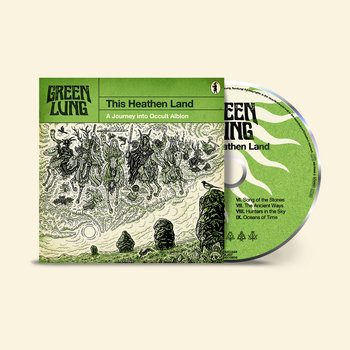
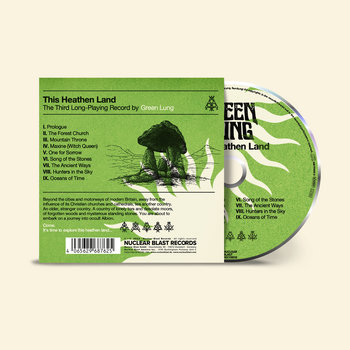
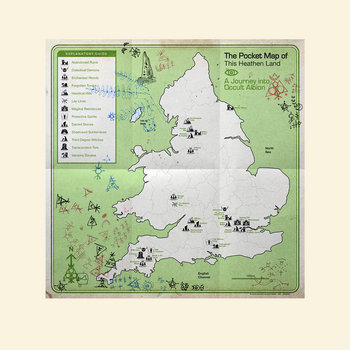
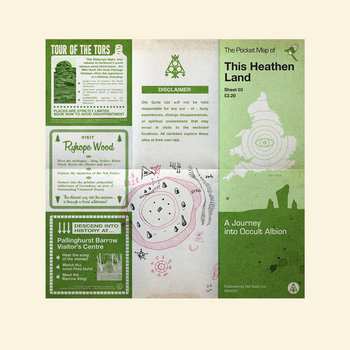
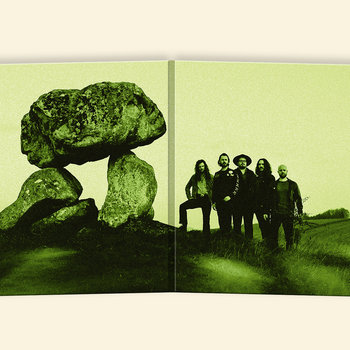
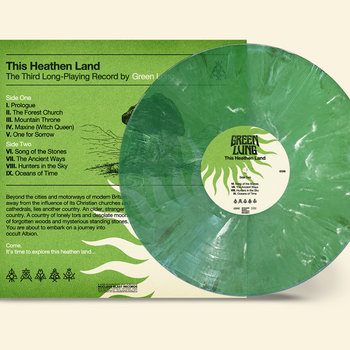

Compact Disc (CD), Vinyl LP, Vinyl Box Set




Now 35, Templar remains a chronicler of what’s sometimes called Wyrd Britain—“a country of lonely tors and desolate moors, of forgotten woods and mysterious standing stones,” per the spoken word bit that opens Green Lung’s third full-length, This Heathen Land. Subtitled A Journey into Occult Albion, the album draws on literature, film, history, counterculture, and radical politics to fill in the map of this alternative England.
“I realized that I’d basically written a bunch of songs that were really rooted in place and landscape in Britain, and I’d wanted to go—it sounds like a simple distinction, or a minor one—from folk horror to folklore,” Templar says. “I had this moment of revelation where I was like, ‘This is a kind of guide.’ [It was] a way to pitch this as a journey to the listener, for people to go out and visit these songs.”
The guide that Templar mentions isn’t merely figurative. This Heathen Land’s vinyl edition comes accompanied by a printed map marking key places, people, and events referenced across the album. There’s Pendle Hill in Lancashire, where ten accused witches were executed in 1612, and which Green Lung immortalizes on “Mountain Throne.” In Devon, you’ll find Wistman’s Wood, a center of the ongoing “right to roam” campaign led by wild-camping advocates in Dartmoor. The Swinging Sixties occultist Maxine Sanders has long made her home near the band’s London headquarters. As Templar rightly notes, these stories push Green Lung beyond the borders of their early horror movie fixation and into a wider, wilder world.
Templar started Green Lung with guitarist and co-songwriter Scott Black in 2017, and at the time, he hoped it would be “a trashy, stoner, doom-y love letter to stuff I liked as a kid.” The fuzzed-out stomp of Electric Wizard and Cathedral indeed loomed large over the band’s early sound, but they quickly separated themselves from the old-school doom pack with their proggy flourishes and astute meditations on classic UK folk horror—especially the unholy trinity of The Wicker Man (1973), Witchfinder General (1968), and The Blood on Satan’s Claw (1971). 2019’s Woodland Rites and especially 2021’s Black Harvest were satisfyingly heavy, hooky interpretations of the original Green Lung vision, but This Heathen Land feels like a significant leveling up.
“The territory has opened up a bit, and I think that was as much a thing for us as [for] people listening to it,” Templar says. “You set out to do one thing, and it works to a bigger extent than you thought, so you have to then try and keep what’s magic about it, but also push. And I don’t think I knew how to do that with the second record, really. I think we were halfway there.”
“With this one, it was just really obvious,” he continues. “It was the storytelling. It was being able to make it feel like a Green Lung thing whilst also doing a proggy song, a doomy song, a pop-y song, whatever. Not feeling like we have to be stuck in a genre was a really liberating thing, I think, because the storytelling, the folklore-y stuff, it kind of weds everything together. It feels like there’s just much more of a world there to explore than we thought at the beginning.”
This Heathen Land doesn’t sound much like a stoner doom album. It sounds more like an album from the late ’70s, before metal got broken down into its endless subgenres; a time when a lot of the bands we now credit as godfathers of metal still thought of themselves as bluesy rock groups. It reminds me of Black Sabbath, Rainbow, Queen, and Blue Öyster Cult. (To be fair, it also reminds me of Ghost’s Opus Eponymous, which in turn reminded me of those bands when it came out in 2010.) It’s huge and theatrical—Templar credits the festival circuit with teaching Green Lung to play to the back of the room—but also weird and intimate. The album boasts a palpable, overwhelming sensation of a band figuring everything out.
“I think the secret of the band is: Scott was a classic rock guy, I was a doom guy,” Templar surmises. “He was trying to do a classic rock band, I was trying to do a doom band, and it sort of met in the middle. Only in the last couple of years have we really worked out that that’s exciting and to zone in on that. Don’t try to pull it in different directions. Double down on the midpoint. And maybe that has something to do with why this record worked.”






Compact Disc (CD), Vinyl LP, Vinyl Box Set




Templar’s lyrics, and the stories that inspired them, are another major part of what makes This Heathen Land so effective. In less capable hands, singing about obscure folklore could create a distancing effect for listeners, but Templar is always careful to reinforce the emotional truths at the core of the songs. “Personally, I love bands that literally will do a deep dive on Goethe in a song,” he says. “That’s just not how I write. I’m much more about the hooks, the moments, the feelings side of things. And I think if you over-intellectualize it, you just lose some of the human thing. I don’t need people to know that I know about this, this, this, and this.”
This Heathen Land is also home to the most personal song in Green Lung’s catalog to date. “One for Sorrow” has its folkloric origins in the magpie-counting nursery rhyme of the same name, but Templar twists the title into a self-diagnosis of his own mental health: “I have always been one for sorrow/ I know that wherever I go, it will follow.”
“I had a really tough year, and [that song] was a way of allowing myself to be a bit more unguarded and personal, and to talk about struggles with depression and not make it feel hokey,” he says. “It just felt like the folklore was just sort of there waiting. That one means the most to me as a person because I’m connected to it, and I’m opening up a bit there, more than you usually can in a metal band that’s predominantly concerned with fantasy and such.”
The album also pushes beyond fantasy with its urgent, real-world politics. Green Lung is a staunchly leftist band. They once printed a shirt depicting Edward Woodward’s Sgt. Howie in the final scene of The Wicker Man with the acronym “A.C.A.B.”—for “All Cops Are Burnable.” On their online merch store, you can buy a “Nazi Occultists Fuck Off” patch, with a green fist crushing the fascist-coded “sun wheel” symbol. Far-right movements have attempted to co-opt folklore and occultism for decades, especially in times of political turmoil. “You have a fucking obligation to at least nod to it,” Templar says, and Green Lung do a lot more than that. Their music makes the compelling case that left-wing politics and a fascination with so-called Wyrd Britain are perfectly compatible.
“The social contract is more and more fucked,” Templar says. “It’s pretty bleak. But there’s still this beautiful landscape. There’s all this amazing art. There’s all these traditions that are totally dubious, that you can make your own. The great thing about folklore is a lot of it’s just bullshit. It’s bullshit from Victorian times, it’s bullshit from Anglo-Saxon times—so no one can own it. No one can be like, ‘I’m a white person, and I own the hobby horse or Morris dancing.’ Because fuck knows who owns it. It’s something that’s been handed down by the imagination of human beings, and it’s totally, for me, multiracial, multisexual, undefinable, weird stuff that people like doing because it’s still going on. It’s a continuing tradition.”







